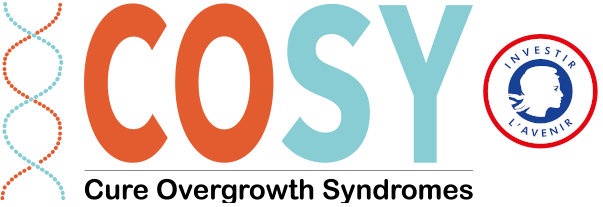The diagnosis process
〉 During the antenatal period, through your gynecologist
The diagnosis is sometimes recommended during the antenatal period, before the association of segmental hypertrophy and/or extensive lymphatic malformation, and/or presence of limb abnormalities.
Your case report will be presented by your gynecologist to a Multidisciplinary Centre for Prenatal Diagnosis (Centre Pluridisciplinaire de Diagnostic PréNatal – CPDPN), where gynecologists, radiologists, and geneticists will be called upon.
〉 After birth, through your pediatrician or general practitioner
The general practitioner’s role is to ensure that patients can have a precise diagnosis and a follow-up plan from an Expert Center (for example Necker-Enfants Malades hospital). The diagnosis will be given as early as possible after birth, before the presence of segmental hypertrophy associated or not with skin, vascular, and extremity abnormalities.
The pediatrician or general practitioner will contact specialized dermatologists, vascular specialists, and/or clinical geneticists, and you will be informed about the following steps to have a genetic diagnosis. For this purpose, sampling of the affected tissue is necessary to identify the causative mutation, which, in most cases, is not detectable in blood. Tissue sampling is performed by a dermatologist at the expert center and, thanks to the application of an anesthetic cream, is painless. The test results are communicated by the expert center and are available within 4 months.
WARNING: The first mention of the name Cloves Syndrome may lead you to do a web search. Information should be analyzed with great caution because not all sources are reliable. Besides, it may contain images that may offend the sensibilities of visitors. Remember that EVERY CASE IS DIFFERENT, and the clinical presentation differs according to the individual ranging from severe to moderate.
Centers for patient care in France
〉 4 Reference Centers
A reference center brings together a highly specialized hospital team with proven expertise in a rare disease – or a group of rare diseases – which carries out its activities in the fields of care, education, training and research. This medical team, also with paramedical, psychological, medical and social, educational and social skills, organizes patient care in connection with all the relevant health professionals.
〉 54 Competence Centers
At the regional level, the Competence Centers establish the diagnosis of rare diseases, implement therapy when available and organize patient care in conjunction with reference centers and nearby medico-social structures.
>Find the Competence Center near your home in the the interactive directory of Fava-Multi
